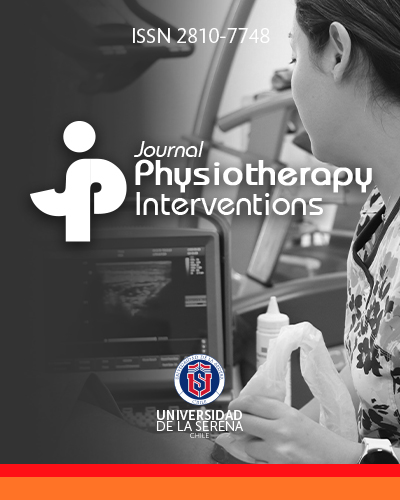Abstract
Background:
Respiratory muscle weakness following invasive mechanical ventilation represents a significant clinical challenge in the recovery of critically ill patients. Inspiratory muscle training (IMT) has been proposed as a strategy to improve muscle strength and facilitate weaning from ventilatory support. However, its effectiveness on clinical outcomes such as dyspnea and respiratory function remains unclear.
Methods:
A systematic review was conducted following the PRISMA guidelines, with a protocol registered in PROSPERO (ID: CRD42023455075). Randomized controlled trials were searched in MEDLINE, Web of Science, and Scopus up to July 2023. Studies involving adults who had undergone invasive mechanical ventilation for more than 48 hours were included, comparing IMT with conventional treatments.
Primary outcomes were inspiratory muscle strength and respiratory function; secondary outcomes included dyspnea and quality of life. The Cochrane RoB2 tool was used to assess the risk of bias.
Results:
Four studies with a total of 376 participants were included. Three studies reported improvements in inspiratory muscle strength with IMT, although no consistent effects on respiratory function or dyspnea were observed. Only two studies assessed quality of life, with mixed results. None evaluated muscle mass. Methodological differences between studies, heterogeneity of devices and protocols, and short follow-up periods limited the strength of the conclusions.
Conclusions:
IMT shows potential for improving inspiratory muscle strength in adults post-mechanical ventilation, but its clinical impact on dyspnea and respiratory function remains uncertain. More rigorous trials with longer follow-up, standardized protocols, and greater emphasis on patient-centered outcomes are needed to support its inclusion in respiratory rehabilitation programs.
References
Goligher EC, Fan E, Herridge MS, et al. Evolution of diaphragm thickness during mechanical ventilation. Am J Respir Crit Care Med. 2015;192(9):1080-8. PMid:None
Medicare.gov. A Quick Guide to Medicare Medicaid.
Accessed October 2024
Añón, J. M.; Gómez-Tello, V.; González-Higueras, E.; Oñoro, J. J.; Córcoles, V.; Quintana, M.; López-Martínez, J.; Marina, L.; Choperena, G.; García-Fernández,
A. M.; Martín-Delgado, C.; Gordo, F.; Díaz-Alersi, R.; Montejo, J. C.; García de Lo- renzo, A.; Pérez-Arriaga, M.; Madero, R. Modelo de Probabilidad de Ventilación Mecánica Prolongada. Medicina Intensiva 2012, 36 (7), 488–495.
PMid:None
EsperRC, Talamantes YG. Evaluación ultrasonográfica del diafragma en el enfer- mo grave. Rev Mex Anestesiol. 2024;43(2):123-130.
PMid:None
Hermans G, Van Mechelen H, Clerckx B, et al. Acute outcomes and 1-year morta-
lity of intensive care unit-acquired weakness. Am J Respir Crit Care Med. 2014;190(4):410- 20.
PMid:None
Wakasugi R, Suzuki K, Kaneko-Kawano T. Molecular mechanisms regulating vascular endothelial permeability. Int J Mol Sci. 2024;25(12):6415.
PMid:None
Sosa, A. Debilidad adquirida en la Unidad de Cuidados Intensivos. RFEM 2019, 14 (2), 0094–0097.
PMid:None
Effectiveness of physical rehabilitation interventions in critically ill patients A protocol for an overview of systematic reviews PLOS ONE https://journals.plos.org/plosone/article?id=10.1371/journal.pone.0284417 Accessed 2023-04-27
Tocalini, P.; Vicente, A.; Manuel Carballo, J.; Ignacio Garegnani, L. Disfunción Diafragmática Asociada a La Ventilación Mecánica Invasiva En Pacientes Adul- tos Críticamente Enfermos. Rev Fac Cien Med Univ Nac Cordoba 2021, 78 (2), 197–206.
PMid:None
Dsouza FV, Bhasi S, Rai BS, et al. Inspiratory muscle training improves exercise capacity and reduces dyspnea in patients undergoing cardiac surgeries: a meta- analysis. Ann Rehabil Med. 2023;47(2):259-270.
PMid:None
Bissett, B. M.; Leditschke, I. A.; Neeman, T.; Boots, R.; Paratz, J. Inspiratory Mus- cle Training to Enhance Recovery from Mechanical Ventilation: A Randomised Trial. Thorax 2016, 71 (9), 812–819.
PMid:None
Pinheiro De C, G.; Saldías P, F. Entrenamiento Muscular Inspiratorio En El Pa- ciente Con Enfermedad Pulmonar Obstructiva Crónica. Rev Chil Enferm Respir 2011, 27 (2), 116–123.
PMid:None
Page MJ, McKenzie JE, Bossuyt PM, et al. The PRISMA 2020 statement: an upda- ted guideline for reporting systematic reviews. BMJ. 2021;372.
PMid:None
Sterne JAC, Savovic´ J, Page MJ, et al. RoB 2: a revised tool for assessing risk of bias in randomised trials. BMJ. 2019 Aug 28;366:l4898.
PMid:None
Bissett B, Leditschke I. Inspiratory muscle training to enhance weaning from me- chanical ventilation. Anaesth Intensive Care. 2007;35(5):776-9.
PMid:None
Bissett BM, Leditschke IA, Neeman T, et al. Does mechanical threshold inspira- tory muscle training promote recovery and improve outcomes in patients who are ventilator-dependent in the intensive care unit? The IMPROVE randomised trial. Aust Crit Care. 2023;36(4):613-21.
PMid:None
Guimaraes, B.; de Souza, L.; Cordeiro, H.; et al. Inspiratory Muscle Training With an Electronic Resistive Loading Device Improves Prolonged Weaning Outcomes in a Randomized Controlled Trial. Crit Care Med. 2021, 49 (4), 589–597. PMid:None
Sandoval Moreno, L. M.; Casas Quiroga, I. C.; Wilches Luna, E. C.; García, A.
F. Efficacy of Respiratory Muscle Training in Weaning of Mechanical Ventilation in Patients with Mechanical Ventilation for 48 Hours or More: A Randomized Controlled Clinical Trial. Med Intensiva 2019, 43 (2), 79–89.
PMid:None
Entrenamiento de la musculatura respiratoria en el destete de la ventilación me- cánica.
https://revistasanitariadeinvestigacion.com/entrenamiento-de-la-musculatura-resp
Accessed 2023-12-09
Martin AD, Smith BK, Davenport PD, et al. Inspiratory muscle training in chronic obstructive pulmonary disease and other conditions: a systematic review and meta-analysis. Thorax. 2020;75(1):123-129.
PMid:None
Condessa RL, Brauner JS, Parreira VF. Effects of inspiratory muscle training on respiratory muscle strength and endurance in patients with prolonged mechani- cal ventilation: a systematic review. Respir Care. 2018;63(6):707-718.
PMid:None
Mota S, Morais A, Reis C, et al. Long-term effects of inspiratory muscle training in patients with chronic respiratory diseases: a randomized controlled trial. J Car-
diopulm Rehabil Prev. 2019;39(5):317-324. PMid:None
Cochrane Review Collaboration. Inspiratory muscle training for patients on me- chanical ventilation in intensive care units: systematic review and recommenda- tions. Cochrane Database Syst Rev. 2022;2.
PMid:None

This work is licensed under a Creative Commons Attribution 4.0 International License.


